When training your dog, concentrate on the end result you're after, as against the patterns you're trying to eliminate. So when you're going through your training routines, think clearly of how you want your dog to react, and hold that image through the session. Never give a second thought to the actions and behavior that you want to avoid.
Without knowing where you're going, it's unlikely you'll ever get there. This is so true with everything in life, and it's true of dog training tips as well
Sometimes we fall into the habit of thinking mostly about what we don't want. This is also the case with dog training too. Not wanting our dog to pee anywhere inside our house is right up there, or chew our shoes, or run away when we call, or bark like maniacs when we have friends come into the house.
But consider this for a second. Especially if you're thinking of getting a new puppy in the home. Would you actually relish the thought of relinquishing the next ten to fourteen years of your life chasing your dog around saying, "No no no"? Don't you think it's a better idea to coach your dog to be obedient and socially acceptable?
For example, instead of thinking, "I don't want my dog to chew the corners of my carpet," try, "My dog will chew and play with his own squeezy toys." Better than, "I hate it when the dog harasses and jumps up on people who visit the house," what about, "I would like my dog to sit to greet people."
By focusing on the positive aspects of your training goals, you'll know exactly what is you are aiming for. I can't think of a better way to get started with training your new dog.
Do Rewards Really Work?
Probably the best thing that has happened in puppy house training during the last decade is a move in focus from highlighting corrective action, or penalizing mistakes, to emphasizing rewards.
Rewarding your dog when he gets it right if highly effective especially for potty training tricks. Perhaps the most important reason is that when you punish your dog, for whatever reason, the effects could be very demoralizing for both of you. Some dogs - not all, but it can happen - may react to being punished by becoming aggressive or fearful. Other dogs shut down. They lose their sparkle. Some may simply curl up and shy away all the time.
Many people also find that reward-based training feels better. It's nice to be a source of praise and treats, instead of a constant disciplinarian.
But the best news is that this approach to dog obedience training works extremely well. That's because rewards help to nurture and strengthen behaviors we want in our dogs. When he learns that a particular behavior gets rewarded, your dog will associate one with the other and learn to repeat the behavior when called upon. With regular practice of the best way to use this technique, you can use rewards to reach virtually any training goal.



No comments:
Post a Comment